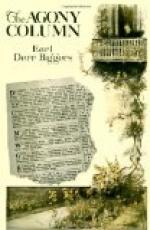“Er—if you’ll pardon me, old chap,” he said. “Not that stick—if you don’t mind my saying so. It’s not tough enough for mountain work. I would suggest—”
To say that I was astonished is putting it mildly. If you know the English at all, you know it is not their habit to address strangers, even under the most pressing circumstances. Yet here was one of that haughty race actually interfering in my selection of a stick. I ended by buying the one he preferred, and he strolled along with me in the direction of my hotel, chatting meantime in a fashion far from British.
We stopped at the Kursaal, where we listened to the music, had a drink and threw away a few francs on the little horses. He came with me to the veranda of my hotel. I was surprised, when he took his leave, to find that he regarded me in the light of an old friend. He said he would call on me the next morning.
I made up my mind that Archibald Enwright—for that, he told me, was his name—was an adventurer down on his luck, who chose to forget his British exclusiveness under the stern necessity of getting money somehow, somewhere. The next day, I decided, I should be the victim of a touch.
But my prediction failed; Enwright seemed to have plenty of money. On that first evening I had mentioned to him that I expected shortly to be in London, and he often referred to the fact. As the time approached for me to leave Interlaken he began to throw out the suggestion that he should like to have me meet some of his people in England. This, also, was unheard of—against all precedent.
Nevertheless, when I said good-by to him he pressed into my hand a letter of introduction to his cousin, Captain Stephen Fraser-Freer, of the Twelfth Cavalry, Indian Army, who, he said, would be glad to make me at home in London, where he was on furlough at the time —or would be when I reached there.
“Stephen’s a good sort,” said Enwright. “He’ll be jolly pleased to show you the ropes. Give him my best, old boy!”
Of course I took the letter. But I puzzled greatly over the affair. What could be the meaning of this sudden warm attachment that Archie had formed for me? Why should he want to pass me along to his cousin at a time when that gentleman, back home after two years in India, would be, no doubt, extremely busy? I made up my mind I would not present the letter, despite the fact that Archie had with great persistence wrung from me a promise to do so. I had met many English gentlemen, and I felt they were not the sort—despite the example of Archie—to take a wandering American to their bosoms when he came with a mere letter. By easy stages I came on to London. Here I met a friend, just sailing for home, who told me of some sad experiences he had had with letters of introduction—of the cold, fishy, “My-dear-fellow-why-trouble-me-with-it?” stares that had greeted their presentation. Good-hearted men all, he said, but averse to strangers; an ever-present trait in the English—always excepting Archie.




